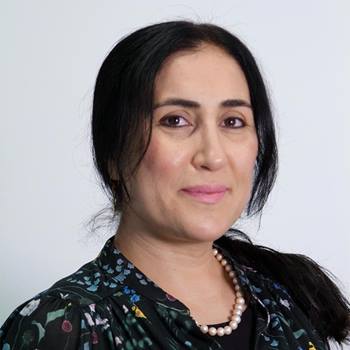 |
Abir Hussain Ph.D & Professor Liverpool John Moores University, UK |
 |
FangXiang Wu Ph.D & Professor ,IEEE Senior member University of Saskatchewan, Canada |
Machine Learning Approaches for the Foresting Financial Time Series
Abir Hussain
Ph.D & Professor
Faculty of Engineering and Technology, Liverpool John Moores University, UK
Email: A.Hussain@ljmu.ac.uk
Personal website: www.ljmu.ac.uk/about-us/staff-profiles/faculty-of-engineering-and-technology/department-of-computer-science/abir-hussain

Abstract:The problem of predicting financial time-series data is an issue of a much interest to both economic and academic communities. Decisions regarding investments and trading by large companies and the economic policy of governments rely on computer modelling forecasts. The foreign currency exchange rates are very important in this respect, with FX market worth an estimated daily trading volume of 1 trillion US Dollars.
Most financial data is non-stationary by default, this means that the statistical properties of the data change over time. These changes are caused as a result of various business and economic cycles (e.g. demand for air travel is higher in the summer months, this can have a knock-on effect of exchange rates, fuel prices, etc). While this information should be taken into account in the current closing price of a stock, share or exchange rate it still means that long term study of the behaviour of a given variable is not always the best indicator of its future behaviour. Traditional methods for time series forecasting are statistics-based, including moving average, autoregressive, autoregressive moving average models, linear regression and exponential smoothing. These approaches do not produce fully satisfactory results, due to the nonlinear behaviour of most of the natural occurring time series. Other more advanced techniques such as neural networks, fuzzy logic and fractals have been successfully used in time series prediction. This talk addresses the problem of financial time series prediction using advanced machine learning approaches.
Bio-Sketch:Abir Hussain is a professor of Machine Learning and a member of the Applied Computing Research Group at the Faculty of Engineering and Technology at Liverpool John Moores University, UK.
She completed her PhD study at The University of Manchester (UMIST), UK in 2000 with a thesis title Polynomial Neural Networks for Image and Signal Processing. She has published numerous referred research papers in conferences and Journal in the research areas of Neural Networks, Signal Prediction, Telecommunication Fraud Detection and Image Compression.
She has worked with higher order and recurrent neural networks and their applications to financial, physical, e-health and image compression techniques. She has developed with her research students a number of recurrent neural network architectures. Her research has been published in a number of high esteemed and high impact journals such as Monthly Notices of the Royal Astronomical Society, Expert Systems with Applications, PloS ONE, IEEE Access, Neurocomputing, and IEEE Transactions on Sustainable Computing.
She is one of the initiators and chairs of the Development in e-Systems Engineering (DeSE) series, most notably illustrated by the IEEE technically sponsored DeSE International Conference Series which is CORE ranked.
Predicting Disease Genes based on Artificial Intelligence
FangXiang Wu
Ph.D & Professor ,IEEE Senior member
Department of Computer Science at the University of Saskatchewan, Canada
Email: faw341@mail.usask.ca
Personal website: www.cs.usask.ca/people/faculty%20profiles/fangxiang-wu.php.

Abstract:From the statistics of Online Mendelian Inheritance in Man (OMIM), there are more a numbers of diseases than that of disease genes that are experimentally verified. The computational methods could play an important role in identifying more disease genes towards the understanding of complex diseases. In this presentation, I will talk about some of our recent results for predicting disease genes based on artificial intelligence models. First, with the concepts of network energy (similar to that for Boltzmann machine), I will present several machine learning models that we developed for predicting disease genes from biomolecular networks. I will also introduce two deep learning models: deep belief network and generalized neighborhood based convolutional neural networks, which we developed for predicting disease/driver genes from multiple sources of data.
Bio-sketch:Dr. FangXiang Wu received the B. Sc. degree and the M. Sc. degree in applied mathematics, from Dalian University of Technology, Dalian, China, in 1990 and 1993, respectively, the first Ph.D. in control theory and its applications from Northwestern Polytechnical University, Xi’an, China, in 1998, and the second Ph.D. in bioinformatics and systems biology from University of Saskatchewan, Saskatoon, Canada, in 2004. He worked as a post-doctorial fellow with Laval University Medical Research Center, Quebec City, Quebec, during 2004-2005.
Dr. Wu is a full professor of College of Engineering, and of Department of Computer Science at the University of Saskatchewan, Canada. His current research interests include Machine learning/deep learning computational biology and bioinformatics, Deep learning for medical image analytic and clinical data analytics, and Complex network analytics, stability and controllability. He has published about 360 technical papers in refereed journals and conference proceedings.
Dr. Wu is serving as the editorial board member of five international journals (including IEEE/ACM Transactions on Computational Biology and Bioinformatics, Scientific Reports, Neurocomputing, etc.), the guest editor of more than 20 international journals, and as the program committee chair or member of many international conferences. He has also reviewed papers for many international journals. He is a senior member of IEEE and a registered Professional Engineer in Canada.